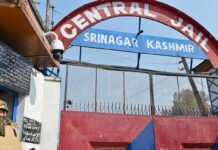She had become a widow nine months after her son was disappeared and died lonely in her one small house waiting for him. Sameer Yasir profiles Mughli’s tragedy.

Next year when you will see those mothers, sisters, kith and kin asking questions about their disappeared relatives in Pratap Park you won’t find Mughli. She is dead. There won’t be any one reciting poignant Kashmiri verses ‘Ha Myani Dardilo Walo, Pyaran Chasai Ya Walo.’ She has left an ‘interminable mark’ on all those who protest in the center of Srinagar for their disappeared loved ones. She would mourn for her son and of others, and with such dignity that her words had become the representation of ‘collective grief’ of all those who sit in to make others listen, ask questions about those who were the only source of income for their families, about those who were the only brothers of their sisters.
Today the house No. 62 in Babapura, in downtown Habba Kadal wears a deserted look. Mughli died in July this year after a never ending wait for her only son, Nazeer Ahmad Teli. A schoolteacher by profession, Nazeer, had disappeared on September 1, 1990 during those deathly times when uncertainly ruled Kashmir.
After the disappearance of her son Mughli became one of the first members of a tragic club of several thousand women whose young sons or husbands have disappeared, the majority of them after being picked up by police or security forces.
She had become a widow at the age of 18 nine months after becoming a mother and for the sake of her only son, she turned down pleas of her parents to marry for the second time. At the age of 10 Nazeer had taken over the responsibility of the household. Working first as labourer at many places in city and simultaneously studying to become a teacher, the profession he loved the most.
When she died, recall her neighbors, she only said few words. Among them was “Nazeer maa aaw.” She never celebrated a festival and would say that when “her son would return she would celebrate”, a wish that remained unfulfilled.
Her journey to trace her son had taken her to almost every jail and army camp. She had met politicians and police officers but no one had an answer about her son.
She would visit shrines were most of the Kashmiri go for solace and even went for pilgrimage to Hajj. But her search never ended. It was just some days before her death that she sat in Pratap Park and cried like a desperate mother looking for her only child would. As if she knew this was her last attempt. In that last sit in on of July 10 she requested the chairman of the APDP to never give up the fight for the disappeared and never succumb to any pressure.
Parveena Ahanger, the founder and head of a split group of APDP, says “ for me she was more than a mother. Her death was a personnel loss. She always supported me and people associated with us in our endeavor to fight to know about our loved ones. Just days before she died she extracted a promise not stop the search for her son even after her death.’’
“As if the loss of her son was not enough, in her last days every other disease became an adjunct to her suffering. Her search for her son had left her without both energy and money.”
So this year, there won’t be any one to hold the picture of Nazeer for whom Mughli sat in for years. There won’t be anyone who will visit the police stations, military camps, the large houses of politicians for clues, there won’t be anyone who would visit human rights commission for a hearing, there wont be anyone who would look from that ‘Zoon Dab’ up to late in the evening for “Nazeer man aye”.
Mughli’s death has frightened all those who are waiting for justice, for their loved ones to return. Fear that one day they also might perish without getting answers.















